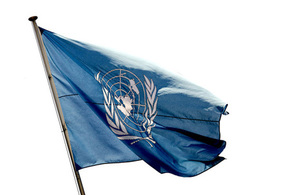UK Statement to the UNGA 73 First Committee on Other Weapons of Mass Destruction
The UK reinforced their disapproval of chemical weapons and condemned their recent use in Douma by the Assad regime as well as in Salisbury by Russia.

The UK aligns itself with the statement delivered by the European Union. I would like to make some remarks in a national capacity.
The use of chemical and biological weapons is repugnant to human conscience. The complete ban on their production and use is a central pillar of international law. The norm against their use has persisted for decades.
Yet today, tragically, chemical weapons are still being used. Most recently, and shockingly, they have been used in Douma by the Assad regime and in Salisbury by Russia. We condemn all use of chemical weapons by anyone, anywhere.
These appalling attacks constitute clear breaches of the Chemical Weapons Convention. They are an affront to the Rules Based International System and the huge efforts made by the international community to consign these heinous weapons to history.
The wave of expulsions of Russian officials following the attack in Salisbury in April this year demonstrates the degree of unity on this issue within the international community.
Identifying the perpetrators of chemical weapons attacks is an important step in ensuring accountability and in deterring future attacks. Russia has prevented action at the UNSC to investigate and hold to account those responsible for the use of chemical weapons in Syria. The Decision achieved at the Conference of States Parties to the Chemical Weapons Convention in The Hague in June was a clear sign of the international community’s commitment to reinforcing norms against chemical weapons use.
It is now time to take forward this work.
We are already supporting an increase to the OPCW’s regular budget, and pledged an additional £1million to help the OPCW implement the June Decision. We call for all States Parties to pay their dues to ensure such key conventions are properly resourced.
We have to strengthen the capability of the Organisation tasked with protecting the Convention. November’s Conference of States Parties will be an important further step towards this goal.
Mr Chair
The Biological and Toxin Weapons Convention is the cornerstone of the international ban on biological weapons. We must ensure that the Convention remains effective and global in its reach. Efforts to secure universal adherence and full and effective implementation of the Convention by all States Parties are key tasks. We call upon the Secretary-General, the Chair of the 2018 Meeting of States Parties, the States Parties themselves, and the Implementation Support Unit to work together urgently to develop measures to secure sustainable funding and a healthy future for the BTWC.
Mr Chair
The proliferation of ballistic missiles, in tandem with the illicit development of weapons of mass destruction, continue to pose a grave danger to regional and global peace and security.
We re-iterate the call on Iran made in Security Council Resolution 2231 not to undertake any activity related to ballistic missiles designed to be capable of delivering nuclear weapons, including launches using such ballistic missile technology. We must all do more to ensure that Resolution 2231 is rigorously enforced; we urge all partners to report any evidence that Iran is conducting activity contrary to Resolution 2231 to the UN Security Council.
The Missile Technology Control Regime and the Hague Code of Conduct are the two principal instruments in the field of ballistic missile proliferation, and the UK welcomes their important work.
Finally, Mr Chair, I wish to highlight Security Council Resolution 1540 and the central role it plays in preventing nuclear, chemical and biological weapons and their means of delivery, and related materials, falling into the hands of non-state actors, including terrorists. The 2016 Comprehensive Review and the adoption of Resolution 2325 was the most significant revision to the work of 1540 in its 13 year history, and a welcome example of Council consensus on non-proliferation issues. We must continue to promote its effective implementation if we are to tackle the threat that non-state actors including terrorists pose.